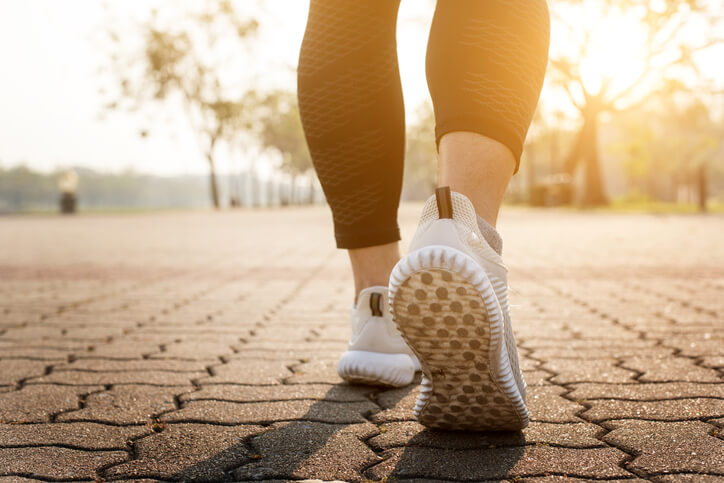Think Getting 10k Steps is Enough? Walking Speed Matters Too
7 years ago | Physical exercise
By Joy Stephenson-Laws, JD, Founder
Maybe it’s because I’m tall or I’ve always been an active person, but I naturally walk at a pretty fast pace. And I usually find myself getting impatient when I’m walking in a crowded place and someone in front of me is walking slowly. I even get slightly annoyed when I can’t get around them.
Of course, I sympathize with the elderly or disabled who might not be able to walk very fast. However, it’s usually someone young in my walking path who appears to be capable of speeding up their step.
Nowadays, I’m trying to be more patient in crowds. But I recently came across a new study that discusses how our walking speed may be linked to our health. In fact, the rate at which we walk may be so important for evaluating our health that doctors may add this to the round of routine tests at check-ups, along with measuring blood pressure and checking body mass index (BMI). So now I am encouraging others to pick up the pace when they can.
“Walking speed (WS) is a valid, reliable, sensitive measure appropriate for assessing and monitoring functional status and overall health in a wide range of populations. These capabilities have led to its designation as the ‘6th vital sign’,” reports the National Institutes of Health (NIH).
(Vital signs are usually blood pressure, heart rate, respiratory rate, temperature and sometimes oxygen saturation level (amount of oxygen in the blood)).
Assistant Professor (USC Division of Biokinesiology and Physical Therapy) Christina M. Dieli-Conwright, in this report about the study suggests that a strong “predictor of mortality is gait speed.”
According to the researchers, the quicker your gait the better results you will have when facing certain health obstacles. For example, the report says that the Journal of The American Medical Association (JAMA) is contemplating having cardiac surgeons use gait speed to identify patients who may have difficulty recovering from surgery. A slower gait may also alert doctors to someone having health issues such as cardiovascular disease or cognitive impairment.
Professor Dieli-Conwright is currently looking into how exercise may affect breast cancer survivors. Gait speed is one of the things she and her team are measuring.
"The idea is the more sick somebody becomes—whether it's from cancer treatment or another disease condition—they lose strength and they lose the ability to move," Dieli-Conwright said.
“Imagine if someone didn't exercise at all. They're going to be impacted more by chemotherapy that keeps them in the bed."
Furthermore, JAMA believes doctors may be able to use gait speed to determine a person’s biological age (how old a person seems), which could be older or younger to their chronological age.
This all doesn’t mean you need to start speed walking through the airport or grocery store.
“The lesson isn't to start walking faster, there's no evidence to prove that upping your gait speed impacts your health. But it's important to pay attention to how physically active you are. In the study, fast walkers declined at a slower rate than slower walkers, which led to better health outcomes. If your gait slows down, especially significantly, it could indicate an underlying condition,” according to the report.
So the main takeaway from this new study is that physical activity is indeed part of the equation to be proactive about your health. And if you notice that your gait is slowing down, you might want to consider getting a check-up. Do not just attribute your slower gait to age or exhaustion.
Power Your Walks With Good Nutrition.
Whether it’s with your dog or with a friend, walking can be a great, enjoyable exercise. And as with any physical activity, it is extremely important to fuel your body properly so that you can get the most out of your exercise and recover as best as possible after.
If you are an endurance walker, as in you walk for many miles or go for long hikes, fuel up with foods that will give you lasting energy such as whole grains and healthy fats like avocados. Read here for specific vitamins and minerals that may help properly fuel your body for physical fitness. And don’t forget to stay hydrated.
Finally, it is highly recommended that you take routine nutrient tests. If you have any nutrient imbalances or deficiencies, this may affect your ability to walk or perform other physical activities. Nutritional issues may also increase your chances of developing disease and may exacerbate ailments you may already be suffering from, like chronic pain and fatigue. If your nutrient test reveals you have any imbalances or deficiencies, a competent healthcare professional can work with you on adjusting your diet and possibly recommend quality supplements you can take.
So pick up the pace and enjoy your healthy life!
The pH professional health care team includes recognized experts from a variety of health care and related disciplines, including physicians, attorneys, nutritionists, nurses and certified fitness instructors. This team also includes the members of the pH Medical Advisory Board, which constantly monitors all pH programs, products and services. To learn more about the pH Medical Advisory Board, click here.







